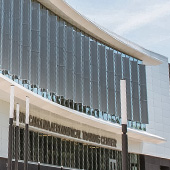Engineering Technology (EGR)
Courses
| EGR 001 | EGR 001 | * |
|
Indicates credit given for engineering technology course work transferred from another college for which there is no equivalent course at TTC. *Hours vary depending on external course.Read More |
||
| EGR 104 | Engineering Technology Foundations | 3 |
|
This problem-based course introduces the student to fundamental concepts of electrical, mechanical, thermal, fluids, optical and material systems related to engineering technology. Workplace readiness skills such as laboratory safety, communications and teamwork are integrated into the course.Read More Prerequisites |
||
| EGR 110 | Introduction to Computer Environment | 3 |
|
This course provides an overview of computer hardware, available software, operating systems and applications.Read More Prerequisites |
||
| EGR 170 | Engineering Materials | 3 |
|
This course is a study of properties, material behaviors and applications.Read More Prerequisites |
||
| EGR 175 | Manufacturing Processes | 3 |
|
This course includes processes, alternatives and operations in the manufacturing environment. Key elements of manufacturing processes such as quality, materials management, personnel issues and industrial economics will be covered.Read More |
||
| EGR 194 | Statics and Strength of Materials | 4 |
|
This course covers external and internal forces in structures and/or machines, including conditions of equilibrium, systems of force, moments of inertia and friction. It also covers stress – strain relationships in materials.Read More Prerequisites |
||
| EGR 202 | Introduction to Engineering Programming | 3 |
|
This course is an introduction to algorithm development and the use of a high-level programming language to solve engineering problems.Read More Prerequisites |
||
| EGR 234 | Control Principles | 3 |
|
This course is a study of fundamental control process, analogous system of units, first and second order response, the fundamentals computer control systems, and applications of a typical process.Read More Prerequisites |
||
| EGR 255 | Engineering Technology Senior Systems Project | 2 |
|
This course includes an instructor-approved project which is designed, specified, constructed and tested.Read More |
||
| EGR 260 | Engineering Statics | 3 |
|
This course introduces the principles of engineering mechanics as applied to forces and force systems. The techniques of vector mathematics are employed.Read More |
||
| EGR 262 | Engineering Dynamics | 3 |
|
This course introduces the principles of engineering as applied to kinematics and kinetics of particles and rigid bodies. The techniques of vector mathematics are employed.Read More Prerequisites |
||
| EGR 269 | Engineering Disciplines and Skills | 2 |
|
This course assists students in selecting an engineering field while studying professionalism, ethics, safety, communications, and career planning. Computers are used to study spreadsheets, obtain graphical solutions to problems, perform on-line tasks, and work on a team design project and report.Read More Prerequisites |
||
| EGR 273 | Problem Solving for Engineers | 2 |
|
This course covers basic problem-solving techniques as applied to the engineering profession.Read More Prerequisites |
||
| EGR 274 | Engineering Applications of Numerical Methods | 3 |
|
This course is a calculus-based study of the application of numerical methods to the solution of engineering problems. Techniques include iterative solution techniques, methods for solving systems of equations, numerical integration, differentiation and graphical analysis.Read More |
||
| EGR 275 | Introduction to Engineering/Computer Graphics | 3 |
|
This course is a study of basic graphical concepts needed for engineering applications.Read More |
||
| EGR 282 | Introduction to Civil Engineering | 2 |
|
This course covers the engineering process from problem formulation to creative design through practical solution of civil engineering problems.Read More |
||
| EGR 285 | Engineering Surveying I | 3 |
|
This course covers linear measurements, leveling, compass and transit/theodolite, theory of errors, areas, stadia, coordinate geometry, state plane coordinates and standard map projections. In addition, it covers latitudes and departures, construction field control, legal aspects of land surveying and public land surveys.Read More |
||
| EGR 286 | Engineering Surveying II | 3 |
|
This course covers land surveying and boundary laws, public land surveys, topographic mapping, horizontal and vertical curves, lot calculations, and engineering astronomy. In addition, it covers geospatial representation that includes topographic mapping, advanced adjustments using least squares procedures, map projection, state plan coordinator, astronomic control for mapping, Global Positioning Systems (GPS), Geographic Information Systems (GIS) and remote sensing.Read More |
||
| EGR 290 | Numerical Applications in Engineering Technology | 3 |
|
This course provides the fundamental concepts of numerical problem solving for engineering technology. Techniques and methods are employed to develop a problem solving methodology using the principles of algebra and trigonometry.Read More Prerequisites |
||
| EGR 295 | Engineering Surveying Lab I | 1 |
|
This course covers horizontal control, including distance and angular measurements; traversing and preparation of a plat; and vertical control including the performance of a level loop. It includes application of principles introduced in EGR 285.Read More |
||
| EGR 296 | Engineering Surveying Lab II | 1 |
|
This course covers locating buildings and other objects within a boundary survey, performing a topographic survey, preparing a topographic map and staking out a horizontal curve. In addition, it covers Global Positioning Systems (GPS) mapping controls, Geographic Information Systems (GIS) applications and application of principles introduced in EGR 286.Read More |
||
| EGR 281 | Introduction to Algorithmic Design I | 4 |
|
This course integrates a presentation of concepts of object-oriented programming, including program structures, objects, code, and programming styles.Read More Prerequisites |
||
| EGR 283 | Introduction to Algorithmic Design II | 4 |
|
This course is a study of rigorous development of algorithms and computer programs, including elementary data structures.Read More Prerequisites |

